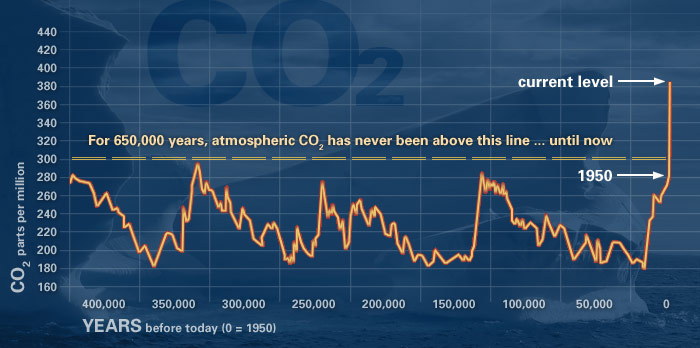In the past year climate change seems to have taken a forefront in the collective global consciousness- and not a moment too soon. Global greenhouse gas emissions are at an all-time high. Already we have caused significant climate changes, some of which may be irreversible and could be potentially catastrophic despite our current efforts to reduce emissions.

Atmospheric CO2 levels (https://globalclimate.ucr.edu/images/evidence_CO2.jpg)
The task of reversing the rising temperatures seems daunting and even fruitless, but I believe that viewing the issue as a challenge rather than a problem can take us a long way. This is exactly what Bill Gates does in a recently published open letter. He addresses some of the most pressing challenges the world currently faces, and identifies areas in dire need of scientific and technological innovation.
Naturally he touches climate change, and emphasizes the need for nuclear energy advancements. Nuclear energy is a ‘clean’ source of energy, meaning it is derived from renewable, zero-emissions sources. It comes from harnessing the energy released from the splitting of atoms to create electricity. It is an alternative to burning fossil fuels, along with solar, wind, hydro, and geo-thermal energy to name a few. However, unlike its counterparts, it has the advantage of being available at all times and easily scaled up. Nuclear power has the potential to match the demands currently met by fossil fuels and then some. If we are to meaningfully combat climate change, we need to significantly decrease our emissions. Nuclear is an ideal energy source for these reasons.
This video which is the first in a three part series is a great rundown on nuclear energy:
https://www.youtube.com/watch?v=rcOFV4y5z8c
This all sounds very promising, so why does nuclear only meet up to 10% of the global energy demand? Despite its advantages, there are many opponents to the advancement of nuclear power. I have identified what I believe to be the three biggest hurdles:
Waste and pollution:
Nuclear waste is extremely toxic and radioactive, and takes thousands of years to break down. We currently have no way of dealing with it except for burying it and hoping it doesn’t leak. This does not sound very foolproof and it is easy to see where concerns regarding contamination may arise.
Safety concerns:
Remember Chernobyl and Fukushima? Over 60 years, there have been four major accidents in nuclear reactors. Each one caused significant damage and rendered the surrounding areas inhabitable for several decades. These accidents are due largely to outdated facilities and improper maintenance.
:max_bytes(150000):strip_icc()/89134143-56a2acbd3df78cf77278b1c3.jpg)
Chernobyl (89134143-56a2acbd3df78cf77278b1c3.jpg)
Public perception:
The word “nuclear” carries a decidedly negative connotation and provokes images of weapons and catastrophe. Poor public perception has stagnated research since the late 80’s. Good scientific communication is necessary to change this opinion to obtain more funding and brainpower.
Nuclear energy has some clear pros, and at this point I would say that it is almost necessary to combat rising atmospheric CO2. There are currently several functioning reactors around the world but not nearly enough, and the technology is soon to be outdated if not already. In order to see the desired results, we must commit fully to this technology. This requires more funding and political will, which currently is not there. It is my hope that in the next decade, it will become more clear that nuclear energy is both the her0 we deserve and need.

The Dark Knight. https://us.123rf.com/450wm/philhol/philhol1205/philhol120500029/13477059-spotlight-on-nuclear-energy-power-stations.jpg?ver=6
-Adria Lwin
